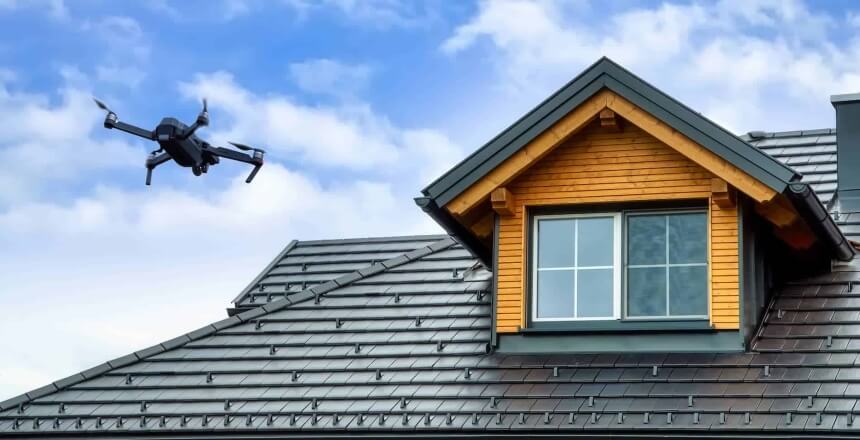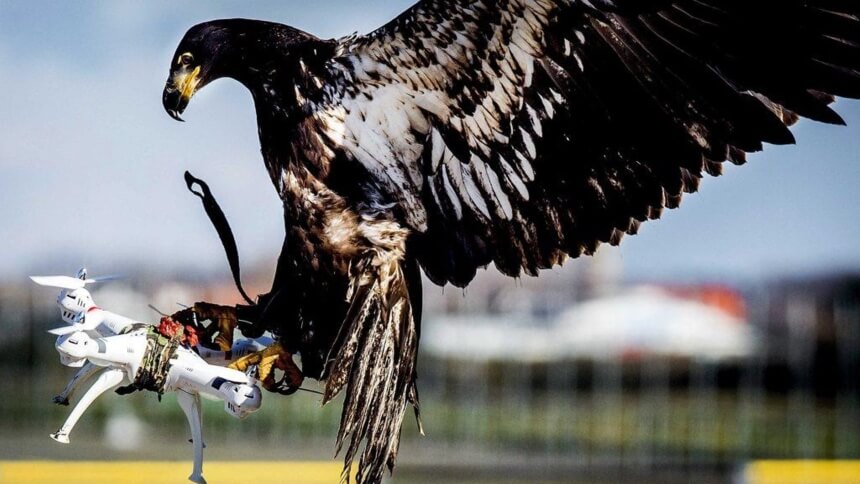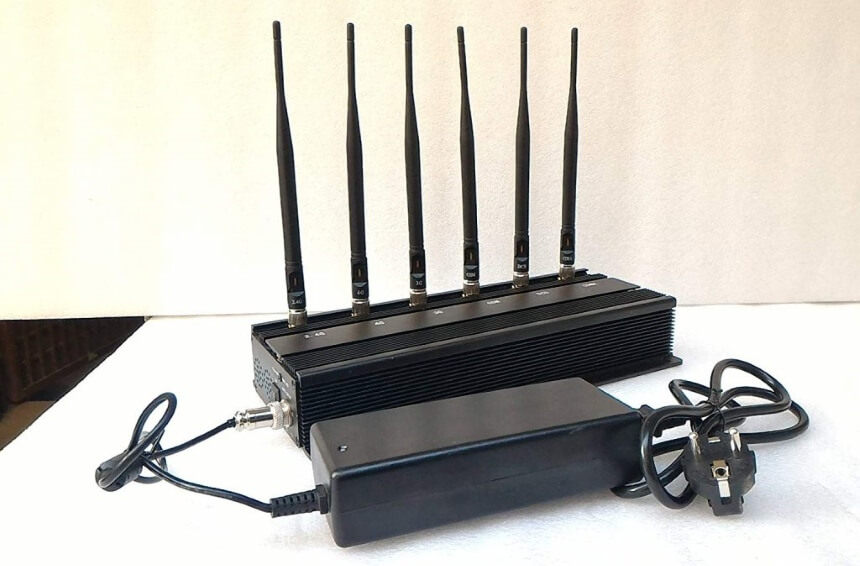If your neighbor has a drone, it is possible for them to see all the things that are happening in your compound and even your home. If you want to protect your privacy, this article provides tips that can help you.
Here, we not only discuss how drones can be a threat to your privacy and security, but we go a step further to show you how to disable a drone on your property. Along with this information, you will also learn some of the regulations that regulate drones and how you can use these regulations to your advantage.

Drones also serve very useful purposes when used correctly. For example, they are used for roof inspections.
If you are not fond of having your privacy and security breached, you certainly need to know what can be done to any drones that trespass.
What are some of the legislations that regulate drones? Here are some of the more important things that you need to know.
In December 2015, a new regulation went into effect that affects the registration of drones. According to this regulation, all drones weighing more than 250 grams and less than 55 pounds have to be registered.
There are over a million drones registered with the FAA, with a large chunk of them being recreational drones. The DJI Mavic 2 Pro is one of the highly-rated drones that reviews recommend. Part of the accessories that can help you get the best from this drone is the highly recommended Release and Drop device.
Apart from the laws put down by the country, there are also state and local laws & regulations. You can find out which laws apply to your state here Trusted Source Drone Laws & Regulations: Do You Need a License to Fly? Do you need a license to fly a drone? Here are the laws, FAA regulations and rules you need to be aware of to legally pilot your drone. www.businessinsider.com . You can also consult the full list of drone rules and guidelines from the FAA here Trusted Source Recreational Flyers & Modeler Community-Based Organizations - FAA The rule for operating unmanned aircraft systems (UAS) or drones under 55 pounds in the National Airspace System (NAS) is 14 CFR Part 107, referred to as the Small UAS Rule. However, if you want to fly a drone for purely recreational purposes, there is a limited statutory exception (“carve out”) that provides a basic set of requirements. www.faa.gov .

According to the guidelines laid down by the FAA, the air over your private property is not ours. That airspace is owned by the FAA, and anything that happens there that is not in violation of the FAA regulations is legal.
Therefore, if you have a drone and are worried about flying it over people’s property, there is no need to worry as long as what you are doing isn’t in violation of the FAA rules. One of such rules that you must keep to is that your drone must be below 400 feet from above the ground.
This is good news if you are a drone pilot, but isn’t much consolation if someone is flying their drone over your house.
If this happens, could you take out your shotgun and shoot the drone down? As satisfying as that might be, you will get in trouble with the FAA if the drone owner decides to press charges.
Yes, shooting down a drone or damaging it while it’s in the air is not legal. However, there are exceptions to every rule. You can shoot down a drone or damage it without any repercussions if you can prove any of the following:
The onus is on you to prove to the court any of these claims.
Therefore, we don’t yet have any way to legally destroy or damage a drone. However, do not despair. There are roundabouts that can help you to keep errant drones out of your property. The next section covers some pretty creative ways you can deal with these drones.
Here are some best ways to get rid of the problem. Some of these ways are simple and just require common sense. Others are creative and exciting. So, let’s dive right into it!
If you know your neighbor is responsible for the drone flying over your property, then a simple conversation can solve the whole problem. If you start by shooting down the drone, then you might only escalate issues and be on bad terms with your neighbor, and even get arrested by the police.
Therefore, call your neighbor and complain about the drone, telling them why you feel uncomfortable with their flying a drone over your property. Politely tell them that you’d appreciate if they stopped doing so.
You might be surprised that your neighbor has the good sense to listen to you and stops flying over your house or property.
What if you have talked to your neighbor, and they have refused to stop? Then you can take legal steps. Here are three things that you can do.

There are several ways you could argue this. If the drone is noisy – which most drones are – then you could say that the noise from the drone is disturbing your peace and quiet. Filing a court case will, in most cases, cause your neighbor to stop disturbing you.
Another thing you could do is to sue them for trespass. The drone might not be flying on your property, but it is definitely flying above yours and is outside the limits of your neighbor’s house. While you don’t own the air rights above your property, you likely own the air rights surrounding the top of your home.
To win this case, check out the regulations of your state and area before filing the case. To bolster your case, you should take photos of the drone when it is close to your roof or property. This might well sway the judge in your favor.
A real threat posed by drones is an invasion of privacy. These machines might include cameras that can take photos and videos. These could allow a neighbor to watch you and your family or anyone else in on your property.
If you feel that the drone is doing more than flying, but is also taking photos or videos, then you might have a strong case against your neighbor. You could file a private cause of action for invasion of privacy. Armed with proof, you can get the court to stop your neighbor from flying his drone near your house.
If you don’t want to talk to your neighbor and if the drone is already flying over your property, then here are some things that you can do:
This is arguably the most exciting way to bring down the erring drone. However, it is not for everyone. As we have said earlier, shooting down a drone can get you in loads of trouble.
So, while cranking your shotgun and using the drone as shooting practice is admittedly fun, it is certainly not recommended. This method should only be used by law enforcement in extreme cases.

Some of these eagles are pretty great at their work. They can tackle these drones, take them out, and bring them back to you. The whole process is quick and doesn’t harm the birds.

These devices have a good range and will drop the drone right out the sky- without your neighbor being the wiser.
Before using this, though, ensure that it is legal in your state. If it is illegal to use it, you might be arrested just because you own it!
There are several drone disabler apps available on the market. These apps claim to be able to disable or disrupt the signals between a drone and its remote control, effectively bringing the drone down or causing it to fly away.
However, it’s important to note that the effectiveness of these apps can vary, and some may not work as advertised. Additionally, using a drone disabler app without proper authorization could have legal consequences and is generally not recommended.

Since drones are computers, they are susceptible to hacking. You can hack into their network and disrupt how they function.
Another interesting way to stop a drone in its tracks is by using nets fired from a gun. These guns shoot nets from the ground and catch the drone. There are some pretty sophisticated net guns that can track drones, lock on them, and fire nets accurately to capture them.
Destroying a drone that is flying over your property without permission could have legal consequences and is generally not recommended.
Under U.S. law, anyone who aims a laser pointer at an aircraft, including a drone, can face fines of up to $11,000 and/or up to five years in prison. Similar laws exist in other countries, and the penalties for violating these laws can be severe.
If you own drones, this article shows you some of the ways your drone might be trapped. If you don’t have a drone, you can also get in on the fun by getting yours. Check out some pretty affordable drones here.
With this knowledge of how to disable a drone on your property that we have provided here, we believe that you will feel safer in your home. Remember to check with local authorities and the law to ensure that whatever steps that you take to disable a drone flying on your property is legal and wouldn’t get you into trouble.